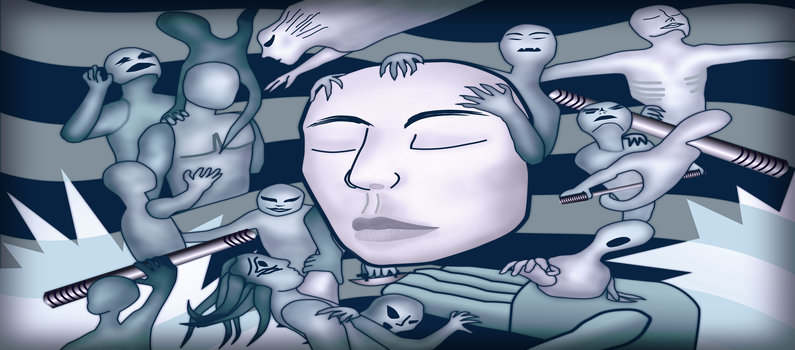Obsessive Compulsive Behaviors And Their Link To Past Lives
By Bryan Jameison
Although many people are inclined to be controlled by repetitive thoughts and/or behavior patterns, most are not disruptive to their lives. Some simply involve rigid behavior, such as having a too orderly home or strict routine, which, when not followed, leads to feelings of anxiety. Being fastidiously clean, gambling, stalking, “unnecessary” shopping, and “workaholicism” are but a few of the of the behaviors classified as compulsions. If the behavior controls the person rather than the person controlling the behavior, the person possibly may need professional intervention to rid himself of this behavior. Thus far, it appears that most compulsions and/or obsessions have their root causes in this or one or more of their past lives.
For example, there are some people who feel they never can get themselves or their surroundings clean enough. In spite of the fact they may spend endless hours cleaning, they are never satisfied with the results. This compulsion often manifests in the form of taking numerous daily showers, constantly washing their hands or spending hours in the bathtub not just soaking, but thoroughly scrubbing themselves. Washing the kitchen floor or vacuuming the rug five or six time a day is another common behavior these people display. Regardless of how often they do this, they still perceive their houses and/or themselves as unclean.
This behavior frequently is traceable to some experience in which they lived and/or worked in unbelievable filth and squalor, or were victims of various forms of sexual abuse in either this or other lives. (It’s usually the victim who feels dirty after being sexually abused, and sadly, no amount of washing will remove these dirty feelings because they have nothing to do with the physical body.) As any rape victim knows, it takes more than a shower to feel clean again. The real cleansing must take place in the soul. Once that’s accomplished, I’ve noticed the dirty feelings often associated with being defiled and the compulsive need to constantly wash or bathe also disappears.
I also have noticed repetitive hand washing frequently is associated with feelings of guilt often relating to some vile use of the hands. Without getting into any of the gory details, one young woman discovered, as a male nearly a thousand years ago, her job was to load the dead and dying on the death carts during one of the plagues somewhere in Europe. The job was so loathsome to him at the time, those morbid feelings of death were carried in his hands from then into his present life as a woman.
These suppressed feelings surfaced in this lifetime at age thirteen when she picked up her dog’s dead body from the roadway after it had been struck by a car. From then on, she continuously scrubbed her hands many times a day, trying in vain to wash away the dreadful feelings of holding her dog’s dead body. Actually, her compulsive act was not caused by the dog’s death, but was a “bleed-through” of feelings left over from her job on the “corpse detail” centuries earlier: The dog’s death was just the trigger. After realizing the cause of her incessant behavior originated in a past-life, she was able to release the constant need to wash her hands.
Variations of this theme commonly occur among people who were inmates of a dungeon, lived on the streets or were lepers in a past life. The common denominator for all of these people is, they lived in squalid filth for extended periods of time and constantly felt unclean. Historically, survival, not personal hygiene, was at the top of the priority list. For most, being clean didn’t seem to matter that much. For others, however, being dirty was an abhorrent experience, leaving deep and lasting imprints on their souls, which then are manifested in their future lives. The compulsion to be clean also can be traced to past lives in a culture with strict, socially mandated cleansing rituals and/or taboos concerning “contamination.”
Other past experiences have caused people to become “workaholics.” They cannot relax, take a day off or enjoy either a vacation or leisure time. They would work twenty-four hours a day, seven days a week if it were at all possible. In addition, they usually are extremely intolerant of others who “work to live” rather than “live to work.”
Since they take pride in their work patterns, the idea of attempting to discover why they are workaholics rarely occurs to them. Whenever the issue of being a workaholic arises during a regression, it usually is not the main focus. Nevertheless, when it’s the primary issue in a person’s life, the most common causes are past lives when the workaholic either was a slave driver or a slave who was severely punished for not working hard enough.
One very successful businessman in his early fifties, Jerome, literally was killing himself with overwork. He was under doctor’s orders to ease up and take some time off; however, he couldn’t bring himself to do so. Upon his wife’s insistence, he finally came to me in the hope of overcoming his inability to relax. During the session, we discovered he formally had been a slave master who relentlessly drove his charges until they finally dropped from exhaustion, after which, he frequently beat them to death. He had absolutely no pity or compassion for them, for that matter, he had more consideration for the welfare of his horses.
As he was reliving that life, he realized his present-day father previously had been one of his slaves whom he had severely mistreated. He now understood why his father had driven him so relentlessly. He also clearly saw that the way he had treated his slaves was causing him to drive himself just as mercilessly as he had once driven them.
Coincidentally, we explored another incarnation in which he had been beaten to death by his master for not working hard enough. In order to avoid this from happening again, he compulsively drove himself always to do more and work harder than anybody else. Just knowing what had happened in his past lives enabled him to understand the basis of his present-day compulsion. After gaining this insight, he was able to release himself from the need to push himself so hard. Several weeks later his wife called to tell me his behavior had changed dramatically after our session. As a result, she said, he had become a much easier person with whom to live with.
********
Another type of workaholic is one who either was physically or mentally unfit for any productive work or had no marketable skills in a past life. As a result, these people were reduced to a humiliating life of scavenging or being beggars. Poverty of body and spirit is something the soul will go to drastic extremes to avoid in the future.
Margie was the star worker in her office, but not by choice. She felt absolutely powerless to refuse a co-worker’s request for help. Her boss always gave her more than her share of the work-load because he knew she always would get the job done. She decided to find out why she felt guilty even when she only was thinking of saying “no.” She discovered that in the causal life, she was a male slave who lacked the physical strength and the stamina to do his full share of the work. He was shunned and looked down upon by the other slaves, who resented him because they had to do his share of the work as well as their own.
In addition to their unkind treatment, he also was viciously beaten by his master until he finally became extremely weak and gave up his will to live. Although the other slaves knew he was dying, none of them offered to help or comfort him. Before leaving the body, his last feelings were those of total despair and abandonment, which he then brought forward into his present life as Margie. Unknowingly, Margie disassociated her former feelings of lack of physical stamina by over-compensating in this life. This time through, no one could ever accuse her of being a “slacker.” Although she was able to release the detrimental emotions associated with her slave life, she’s still a hard worker but now is willing to “leave something to do tomorrow” without feeling guilty.
********
Another example of obsessive-compulsive behavior, the cause of which was found in a past life, was that of Grace. She described herself as “being too honest for her own good.” Throughout her life, the very thought of taking something that didn’t belong to her would cause her to feel horribly guilty for weeks. In addition, she ceaselessly pushed herself to do her very best to outperform her co-workers, always completing her tasks quickly and flawlessly. No employee could be more dedicated to her job than she. She arrived early, usually skipped coffee breaks and lunch, always was available for overtime or extra work.
The primary cause for her behavior was found in a past life in which she was a street urchin in England about 300 years ago. In that incarnation, she had been caught by the authorities for stealing food, and was placed in a workhouse when she was only seven. That remained her home until she died five years later.
Her work day began before sunrise and ended long after sunset. Her primary chores were scrubbing cold, stone floors on her hands and knees and working in the kitchen. The overseer of the workhouse was a huge, cruel man who took pleasure in viciously beating her as well as the other inmates at every opportunity. His beatings always were accompanied by derogatory comments about their worthlessness. He routinely told them they were no good and weren’t worth the cost of their food, which usually consisted of nothing more than an extremely meager portion of watery soup, stale bread and tasteless porridge.
My client’s dreadful mistreatment in the workhouse was the driving force, which compelled her to be such a hard-worker in this life. Also, the constant verbal degradation she suffered then did extensive damage to her present-day self-esteem. She told me that no matter how hard she tried to see herself in another light, she always felt worthless deep within. This feeling was definitely a carryover from that past life.
As might be expected, that incarnation ended violently when, during a fit of rage, the overseer kicked her in the head. Coincidentally, she discovered her killer was her father in this life. She said she instinctively disliked and feared her father from her earliest memories. Apparently he felt the same about her because he always was overly critical and never supported her attempts to educate or improve herself. Although she released the past and present-life anger and hatred she felt toward him, her feelings concerning him remained distant. Like hundreds of others with workaholic tendencies she too has been able to considerably ease up on her compulsive behavior. No longer controlled by her past-life fears of reprisal, she now is able to turn down burdensome assignments without any regret.
Something she failed to mention prior to the regression was that she had been troubled by migraine headaches since puberty. She now attributed their cause to her past-life death in which her skull literally had been crushed by her attacker’s boot.
As of a year and a half after the regression, her headaches have not returned.
********
Several years ago, while on vacation in Florida, I was introduced to Kevin, a man in his mid-fifties. After learning I was a past-life regressionist, he told me he had a problem, which he believed only could be resolved through regression. Even though I was on vacation, he succeeded in persuading me to do what he termed as “an emergency regression.” Like so many others, his problem concerned romance.
As is often the case, even though we began investigating one issue, another surfaced during his session. While talking with him several days before our session, he mentioned he had recently bought a very expensive Shearling coat. (This is a coat with the natural wool on the inside and the rough sheep hide on the outside.) As he was telling me about it, a mutual friend mentioned Kevin had more winter coats and jackets hanging in his closet than anyone else he knew who was living in Southern Florida. He said many still had the sales tag attached because they never had been worn. Oddly, Kevin saw nothing wrong with having a few extra coats, saying he always felt cold.
However, I thought it a bit strange for someone living in a tropical climate to own over twenty winter coats. Thus, during his regression, I asked him if he’d like to check out his driving need to purchase more warm coats than he ever could possibly wear. Agreeing, he regressed to a past life, which apparently originated about 250 years ago in Paris.
In the opening scene, he was a six year-old-boy huddled in a filthy Parisian alley, cold, homeless, and worse yet severely crippled by disease. Kevin described his bones as being twisted and misshapen (probably rickets). In addition to this, he was severely mentally retarded, and lived in constant terror. He survived by scavenging whatever rancid tidbits he could snatch from piles of garbage he found in the alleys. He couldn’t recall a time in his life when he felt warm or secure, but, instead, always felt cold, wet and terrified.
Because of his limited mental capacities, it never occurred to him either to beg or steal food. Throughout his miserable life, he always was the object of abuse from those who needed someone to ridicule, spit upon or kick. When he was twenty-two, he was knifed in the back and put out of his misery by a thief who murdered him for his threadbare coat, which, when held up to the light, one could see through it as if it were made of surgical gauze. The only thing he was aware of as he lay dying in that cold wet alley way, was a fervently deep desire to be warm. It was this unrequited need, which now was the basis of his compulsion to buy coats. His constant feeling of being cold to the bone was just a “bleed through” from that miserable life in “Gay Paree.”
After the regression ended, he told me he actually had driven through Paris on three separate occasions in this life without ever stopping to visit the Louve or even see the Eiffel Tower. While he now understood why he always had driven straight through Paris, he told me he still had no desire ever to visit it. Over the years since his regression, he has called me on the phone or dropped me a note on several occasions saying how much the regression changed his life. Each time he calls, he always proudly tells me he hasn’t bought any new coats. In addition, he said he even has given several of them away, including his most prized Shearling.
********
The slogan “shop ‘til you drop” is no joke to people who suffer from a compulsion to buy things. Many of these people really are not aware their behavior is a problem even though their closets may be completely over stuffed with new, unworn clothes and shoes. Often their jewelry boxes are crammed with expensive jewelry which they also never have worn. They frequently have many charge cards, all of which are at their maximum limit, yet some essential items, such as utility bills and rent, go unpaid or are always late.
This is a common affliction, and usually is easy to eliminate through past life therapy. Following are two of the most dramatic cases with which I have worked. Interestingly, in both situations the women “over-shopped” for entirely different reasons. Even though their behaviors were quite detrimental, neither of them had come to me concerning this issue. Neither of them saw it as a problem. For example, Rhonda saw her buying yarn and yardage on sale as a way of saving money.
Although she hadn’t knitted anything for over ten years, she said she planned to begin knitting again when she retired. It didn’t matter to her that she had at least ten, thirty-three gallon plastic sacks full of yarn plus yardage stuffed away in various nooks and crannies of her home.
She jokingly quoted the following nursery rhyme:
Baa baa black sheep,
Have you any wool?
Yes sir, yes sir,
A whole house full.
From what she told me, she wasn’t kidding. She said she didn’t actually know how much she had hidden away in her house, but said she had spent over $400 on yarn alone on a recent shopping spree. Because she felt very guilty about spending so much money, she hid the newly bought yarn in the clothes dryer. That way she could retrieve it when her husband wasn’t home. Her behavior was similar to that of an alcoholic who hides his booze.
The cause of her need to buy yarn and yardage became clear when she regressed into a past life which occurred in Northern Scotland about 250 years ago. The following story is in her own words.
“I had come to see Bryan mostly out of curiosity, but during our pre-regression conversation, I laughingly told him about having tons and tons of yarn and yardage. He asked me if I would like to find the cause of my incessant need to collect more goods. Curious, I said, “Why not?”
“The first thing I noted about this past life was that it was very cold where I lived. The harsh wind was rippling through the lush green grass, which seemed to stretch to the sky. I somehow knew I was in northern Scotland, where I lived alone in a small, two-room stone cottage, that my husband had built for us many years earlier. The back part of it was built into the hillside, which somewhat shielded it from the biting, cold wind and freezing rain in the winter. From the front of my cottage, I can see for miles. Except for the occasional bleating of the sheep and the sound of the howling wind in the winter, it usually is very quiet. Because I am quite far from the village, I have few visitors and often feel very lonely.
“Not even my children have the time to come to see me anymore. I realize they all are very busy with their own families. Since it is too far for me to walk to the village, I rarely see them. Besides, knitting sweaters takes up all my time. Without the money I make from selling them, I wouldn’t be able to buy food.
“Before my husband died several years ago, we had about thirty sheep. He used to shear and clean the wool and I would spin it into yarn and make the sweaters. I now have less than fifteen sheep, and no longer have the strength to shear them, so I must now pay someone to do it for me. As a result, I barely make enough money to buy the necessities. As time passes, the wool my sheep produce is becoming more sparse, and its quality also is becoming very poor.
“Since the winters here are very cold, my heavy warm sweaters are much in demand. I must say, they are very beautiful; I’m very proud of my work. Although I can neither read nor write, each sweater has its own unique pattern, which I create. The intricate cables, twists and interesting patterns of knit and purl stitches makes each one-of-a-kind. I know they should bring a better price but, because I’m almost destitute and I can’t get to town, the man who buys them from me to resell doesn’t want to give me a fair price. He knows I barely have enough money to buy food and candles for the upcoming winter. Every day I seem to get farther and farther behind and more discouraged.
“Now I’ve gone forward to the time just before my death. I’m only fifty-two, but feel much older. It’s winter, and the wind is howling outside. The days are short and, since I’ve used all my candles, I only can work while there is daylight. I guess it’s just as well, because my hands are very crippled from arthritis, making it almost impossible to knit when it’s so cold. Therefore, I only am able to knit for short periods at a time. I’m feeling very weak now from the lack of food. I barely have been out of my bed for days. Because of the cold, I have brought my three remaining sheep into the house to keep them a wee bit warmer, even though I haven’t had enough firewood for a warm fire in weeks.
“I always feel so very lonely, but it’s worse today because I no longer care to live. Through the one tiny window, I can see the snow gently floating down from the dreary, gray sky. As I watch it, a feeling of peace permeates my body and I can feel warm tears spilling down my cheeks. Things used to be so different, but now no one needs me, not even my children. I only regret I cannot see them just once more before I die. I want so much to tell them I love them. As my eyes close, a wonderful warm feeling envelopes my cold body. Instantly, I’m looking down at it. I see a slight smile on its lips. I’m now leaving and am floating out of the room.
“It was then Bryan suggested I go back into her body just before her death. With tears still rolling down my cheeks, I was reluctant to do so. I didn’t want to feel that desolation again. Bryan then asked why I was crying if I wasn’t still feeling the sadness from that life. Realizing I still was emotionally connected to her even after all of these years, I slipped back into the body, and with Bryan’s help, got hold of all the feelings of loneliness and grief I was experiencing just before I died, and released them into the Light. I immediately felt as if a heavy, dark cloud was lifted from my entire being. Now I understood why yarn was so important to me.” Rhonda called me several months later to say that since her session, she hadn’t even been tempted to buy any more yarn or yardage. She told me that after sorting the yarn she had, she couldn’t help but notice she had every color in her collection except “natural.” She also told me she never had sold any of the sweaters she made. She either gave them away or kept them. Despite the fact it has been over five years since her regression, at last report she still hasn’t bought any more new yarn. She even has given some of it away. However, she hasn’t gotten rid of any of the yardage she owns, but I’m sure that she eventually will.
********
Francis initially came to see me because of her fear of water, which she successfully released after re-experiencing a past-life drowning. Because this took only a few minutes, I asked if she would like to learn why she liked to wear so much jewelry. (My philosophy is similar to that of a dentist doing a root canal. Only after the root canal is completed, does he also fill any other cavities. When the main problem is solved, I have my client check to see if there are any other past-life events which also could be dealt with at the time.)
Rhonda was wearing six rings, as many bracelets, and an ostentatious pendant. Although I didn’t say so at the time, she looked like a jewelry store with legs. She hesitated a moment, then said she just loved her jewelry because it made her feel pretty and caused people to notice her. She said that it also enhanced her feelings of self-worth, and also told me she always had been fascinated by the sparkle of diamonds and calmly assured me there was absolutely nothing wrong with a woman loving jewelry. As with many people who are compulsive, she really did not see her buying jewelry as a problem. She said she knew many other women who also loved jewelry, but conceded she might be overdoing it a bit and agreed to check it out.
Much to her shock and surprise, she regressed into a lifetime when she was a proud owner of an infamous brothel in Portugal during the late seventeenth century. She proudly boasted she had nine ladies working for her. (Despite the fact she was blushing, I noticed a faint smile on her face as she began describing herself and her occupation.)
“As the Madam of the house, I naturally select the best clientele for myself. Though I’m quite short and very pudgy and definitely not the youngest lady here, I certainly know how best to please my clients. Believe me, they all get their money’s worth. In spite of the fact that I’m the highest priced lady in the house, each time I share my bed with a client, he knows he must bring me a gift of jewelry in addition to my fee. Because of this, I have a huge collection of beautiful and expensive rings. I especially love large ostentatious, rings; the gaudier, the better.
“When escorted by one of my young, handsome bodyguards to the theater or to a restaurant, I always wear at least five or six of them. I then flaunt them with sweeping hand gestures, making sure everyone in the place can’t help but notice them, especially my clients’ wives. It makes me feel good inside when their heads turn as I stroll by.
“If I happen to meet one of my clients outside, which is often, I, not-so-subtly, make sure the woman he is with knows of our relationship. Her expression of disdain makes me feel even more powerful. However it is both a joyous and a sad feeling. I have money, power, a beautiful large house, (not a home), and the respect of my “girls,” but I am not happy. The things I desire most elude me. All my money and power cannot buy me the love and respectability I secretly seek.
“The rings and other jewelry I have collected through the years do not fill my emotional void, nor do they really increase my feelings of self-worth. I’m envious of my clients’ wives; but at the same time, I look down on them for being prudish and unattractive. I envy them because they have the husbands and respectability I know I’ll never have. No client ever has told me he loves me, nor have any of them ever invited me to a social event. To them, I am just a night of entertainment, a business deal. Our meetings are in my bedroom where they enjoy my favors for a few fleeting hours, after which they always return to their families and the comforts of their homes and wives.
“The tears were beginning to well up inside of me, but Bryan would not allow me to wallow in my self-pity. Instead, he had me get hold of my sadness and then release it. After the regression, I noted in retrospect there were many parallels between my present life and that of the Madam. In both lives, jewelry was prominent. I felt I needed it to offset my feelings of low self-worth. Like my present husband, my former clients never bought their wives jewelry or anything else, to demonstrate their love.
“No doubt their wives felt just as unloved and unworthy as I have in this life. They probably were dutiful, respectable and proper as well as being very judgmental about promiscuous women as I also have been this time through. In addition, in my present life, I seemingly have everything a woman could want except for the feeling of being really loved and appreciated by my husband, just as I’m sure the wives of my former clients in Portugal must have felt.
“It was only after I was regressed, that I finally saw my urgency to buy jewelry as a problem. Interestingly, I always told everyone who noticed it that my husband had bought my jewelry when in fact, he never had seen most of it because I always kept it hidden from him. I only wore it at work or when he wasn’t around. I always felt very guilty about buying so much of it.”
Since her regression seven years ago, Francis told me she hasn’t felt the need to buy anymore jewelry. She also said she hasn’t gotten rid of what she had, in spite of the fact she seldom wears it.
********
As you can imagine, obsessive-compulsive behavior has a wide range of causes. This disorder is generally obvious to everyone else except the person involved. It can break up marriages, ruin family relationships and, in many cases, be extremely expensive. I’m not about to say that all cases of this disorder are traceable to a past-life cause, but I have found those, which are based in this life or in one or more past lives, are very quickly eliminated once the original cause is discovered and neutralized.
Excerpt from Exploring Our Forgotten Lives: The Amazing Healing Power of Past Life Therapy
Posted in Past Life Therapywith comments disabled.






